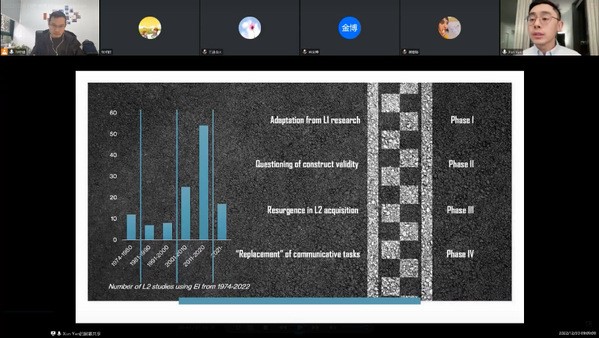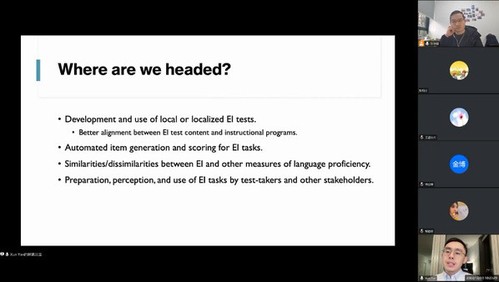On December 30th, the 24th session of “Zijin Lectures” launched by the School of International Studies of Zhejiang University was held at Tencent Meeting online as scheduled. The theme of this lecture is “Putting elicited imitation to the test: What have we learned and where are we headed? This lecture was given by Dr. YAN Xun, an associate professor and doctoral supervisor in the Department of Linguistics of College of Liberal Arts & Sciences at the University of Illinois at Urbana-Champaign, and hosted by Dr. SUN Peijian, a ZJU100 Young Professor in the School of International Studies at Zhejiang University.
At the beginning of the lecture, Prof. Yan first introduced the definition of “elicited imitation” (EI) and the fields it was usually applied to. EI is a language testing method that usually requires participants to listen to a series of stimulus sentences (or phrases, words, sounds) and then repeat the sentences verbatim. There are mainly four historical phases in the relevant studies on EI, including Adaptation form L1 research, Questioning of construct validity, Resurgence in L2 acquisition, “Replacement” of communicative tasks.

On these four different developing phases of EI, Prof. Yan first introduced some important research findings, and revealed the nature of EI as a language level measurement method. Then he discussed the influence of EI in other fields of applied linguistics, and put forward three main questions to be answered, which were 1) the process of utterance production in EI tasks, 2) the nature of the language produced in EI tasks, and 3) how can the information obtained from EI tasks help teaching activities. At last, Prof. Yan reviewed some recent studies by his team to illustrate the potential of this assessment approach, such as “corpus-driven EI tests of Chinese based on courses”, “test-takers’ strategy use in EI tasks”, “studies of fluency characteristics in EI tasks”, etc.
In terms of where to be headed, Prof. Yan shared some forward-looking views, covering development and use of local or localized EI tests, automated item generation and scoring for EI tasks, similarities or dissimilarities between EI and other measures of language proficiency, and preparation, perception, and use of EI tasks by test-takers and other stakeholders.

Later, Prof. Yan expressed his opinions on the use of psycholinguistics and communicative tasks to measure language competence in applied linguistics. By reviewing the four phases of EI and combining with the explanation of empirical studies, we deeply understood that EI, as a L2 level measurement method, is extremely resilient. While some questions about EI remain controversial, advances in cognitive psychology and technology have also expanded the scope of research on this assessment method and reshaped the focus of EI research.
At the end of the lecture, Prof. Yan answered the questions of the teachers and students warmly and comprehensively. Prof. Yan's clear logic, rigorous and pragmatic academic attitude and forward-looking research thoughts displayed in the course of lectures are very beneficial. Although the lecture came to an end, the research ideas proposed by Prof. Yan will attract more scholars to investigate and practice.
Picture/Text: REN Zeqi
Institute of Linguistics and Applied Linguistics in Foreign Languages
December 31st, 2022


